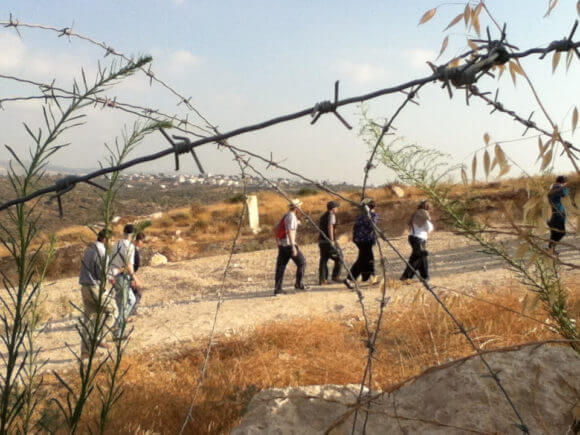The new law passed last week in the Israeli Knesset targets individuals active in Boycott Divestment and Sanctions campaigns against Israel. Understandably there have been questions, and concern, across the activist community on what the ramifications of this ban could mean for the Palestine solidarity movement. Over the past 15 years, more than 1,100 people have joined Interfaith Peace-Builders’ (IFPB) political education delegations to Palestine/Israel. We do not see the new law changing the main processes already happening at Israeli-controlled borders, nor ultimately how groups and individual travelers should plan travel to the region. Rather, we see the principle goal of the legislation to be Israel’s attempt to intimidate activists not to travel; to not try and enter; not to see the realities on the ground that only strengthen the need for BDS and other forms of activism. Israel’s political and military establishment would be thrilled if activists in solidarity with the Palestinian struggle for human rights stopped visiting Palestine. We should not give them that satisfaction.
This is not Israel’s first travel ban
IFPB and our colleagues at the Right to Entry Campaign and other organizations have conducted countless debriefs with individuals who have been questioned by Israeli authorities upon arrival. Patterns of partial or full bans have been clear.
Denying entry to Palestinians, Muslims, other people of color and anyone who does not fit into Israel’s frame of welcomed “guests” has been a tactic continually used by Israeli security officials, even before the legal introduction of this present ban. Since 1948, Palestinians have always been the most affected by these practices. Not only have Palestinians been denied their right of return to homes and properties expropriated by Israel, they have also consistently faced threats – and in many cases the reality – of denial of entry through any border controlled by Israel. Other people of color, especially individuals of Muslim or Arab backgrounds, have also faced high levels of scrutiny, including intimidating processes of questioning, and can be summarily deemed “security threats” and turned away without a robust avenue for rebuttal.
The law will likely not change the basic structure of Israel’s border regime. The first step is – and always has been – racial profiling. Israel’s profiling primarily affects Palestinians and other individuals of Arab or Muslim background. Other people of color, young folks, and those that travel with backpacks, are significantly less likely to be questioned, but it does happen. Unless they appear overtly nervous, white individuals of middle age and above almost never experience further questioning. We do not expect the new law to change this basic premise.
Israel has targeted activists in the past
This law threatening to ban proponents of BDS, should be understood in this context. Historically, after the beginning of the Second Intifada and the founding of the International Solidarity Movement (ISM), individual young travelers with backpacks and loose travel plans were pulled aside for additional questioning when entering Israel. Largely, the questions surrounded organizational affiliation and even direct questions about ISM. At other points, Israeli officials have demanded that travelers sign documents stating that they would not enter the West Bank; or, for those entering through the Jordanian border, stamps indicating that entry is only granted into the West Bank and not “Israel proper”. These practices are largely transient, coming and going from one year or one month, to the next.
In the last 2-3 years, since Netanyahu declared BDS one of Israel’s biggest threats, much of the questioning of individual travelers has shifted to focus on the individual’s participation in BDS. However, the new law does not indicate how it will be implemented in practice. As attorney Michael Sfard told Mondoweiss, “It is not clear how the law will be applied…I guess that at least in the beginning the law will mainly be applied to ‘famous’ boycotters.” We’d add that the law will certainly be applied towards individuals who are already targeted by Israel’s racialized security system: mainly Palestinians, other Arabs, and Muslims.
This is the issue activists should be focused on: just as so many are now fighting Trump’s Muslim Ban, so should we continue to fight Israel’s Ban on Palestinians and others deemed a threat, purely based on their background.
Visit Palestine
Those in the position to do so must continue to travel to Palestine; traveling is one of the best ways to challenge this law and other longstanding practices of discrimination employed at Israeli-controlled borders. Most of us will not face this scrutiny and will enter just as every other tourist. It will not matter if we have signed a petition or organized with a local a BDS campaign. While we travel to learn and see and build solidarity, we must also insist on Palestinians’ abilities to visit family, friends, and their homeland. In doing so, they are risking racial profiling, intimidating lines of questioning, strip searches, and denial of entry. So too, then, can we. For what we risk is far less severe than not having the ability – the right – to go home.



israel should be doing a better job monitoring the web to find those who should be kept out
Visitations between the US and Israel have been regulated under the “exempt” visa arrangement, where no visa is required. Travelers can expect to commit to paying the airfare, and enter the country of destination without hindrance – except if there is a felony offense or some other problem on their record. But if Israel has unreasonably interrogated, detained, or barred admission to US citizens in a continuing pattern, then it is time for the US State Department to renegotiate the agreement with Israel. The next step would be to require “confirmation” that is , prior permission and a visa for travel both ways. There is precedent for this in the 1911 abrogation of the US – Russia trade treaty of 1832 by the US House of Representatives. The link below describes the situation briefly. Russia was barring admission of certain US Jews to parts of Russia. The action reflected tensions in Russia related all the way back to the assassination of Czar Alexander II in 1881, and the revolution of 1905. The treaty was cancelled, and not renegotiated.
http://macrotheme.com/yahoo_site_admin/assets/docs/2MR37Fed.97110557.pdf
Anyone going to Israel should buy a new phone prior to travel and access sites like Arutz Sheva and the Jerusalem post for a laugh. Otherwise hook up with Israeli swingers and promise to meet one and then mention it at the airport. They have no way of knowing who is who.